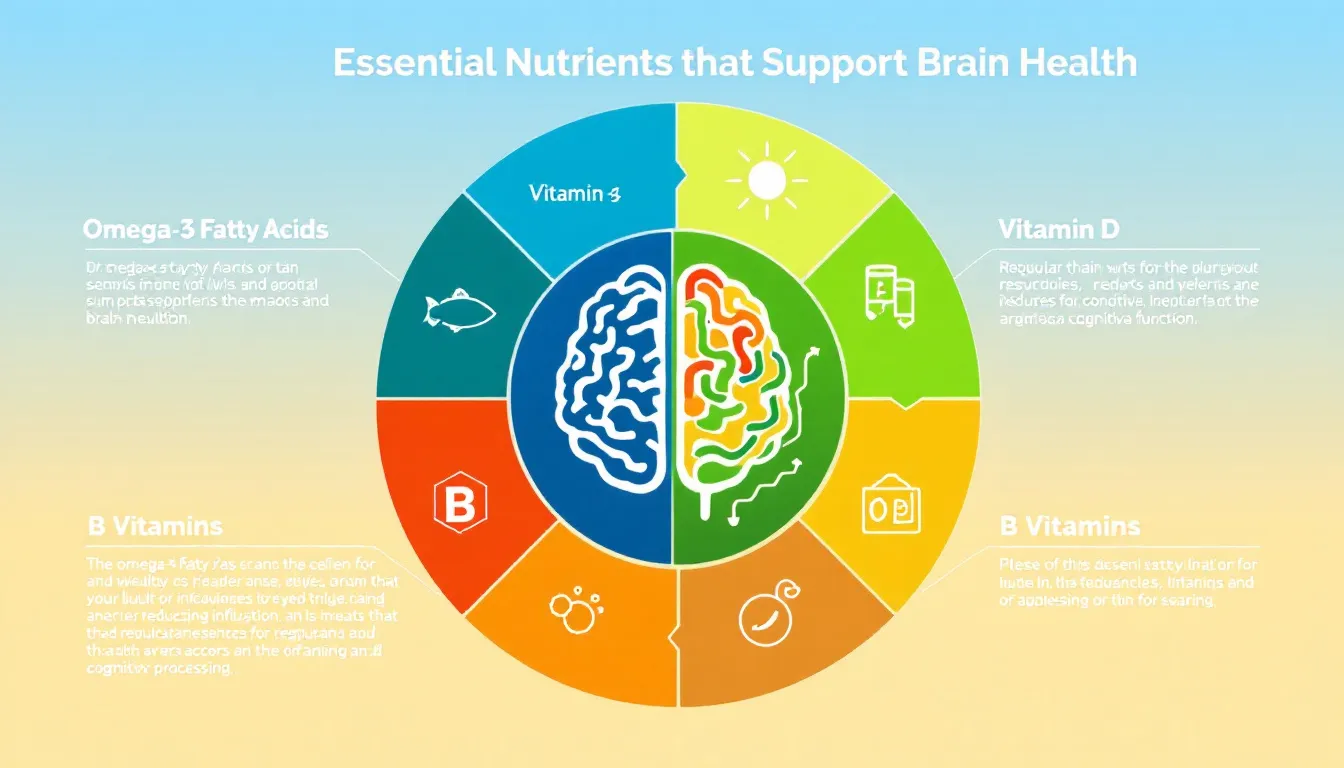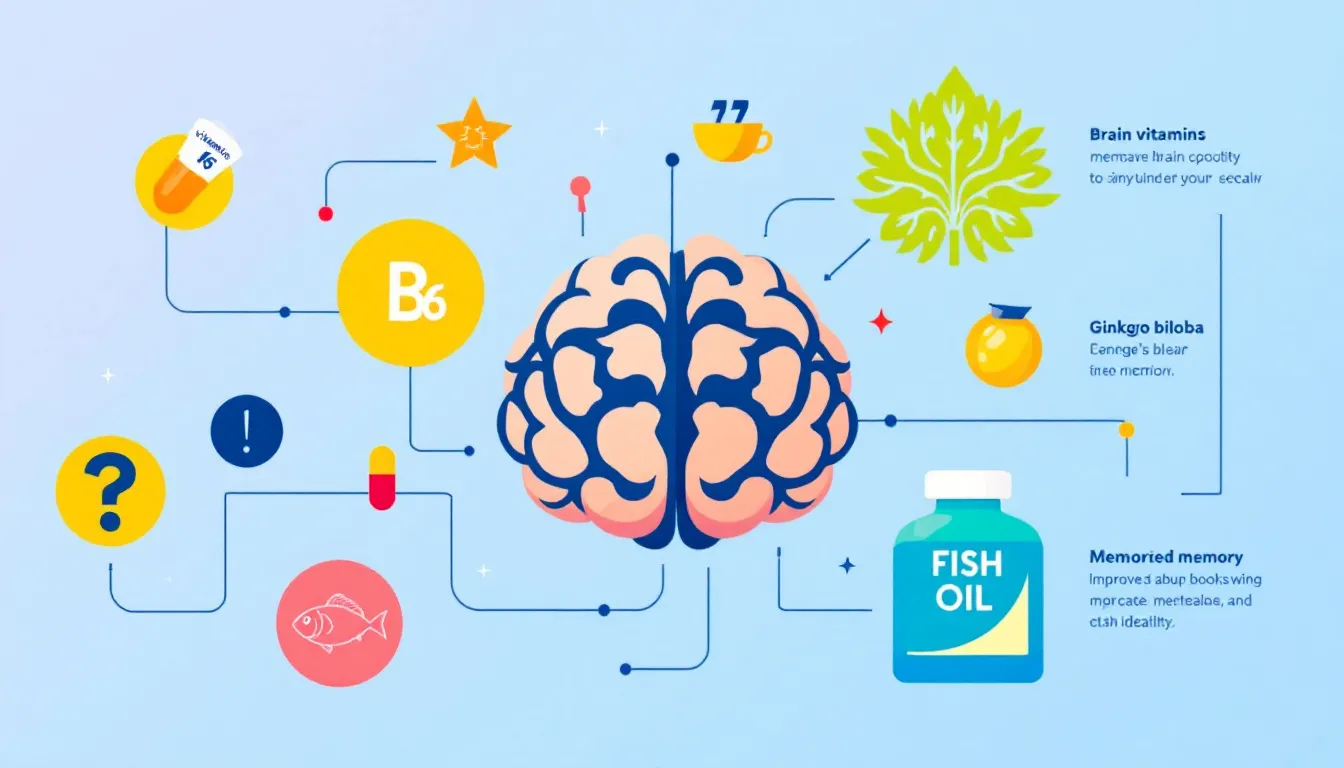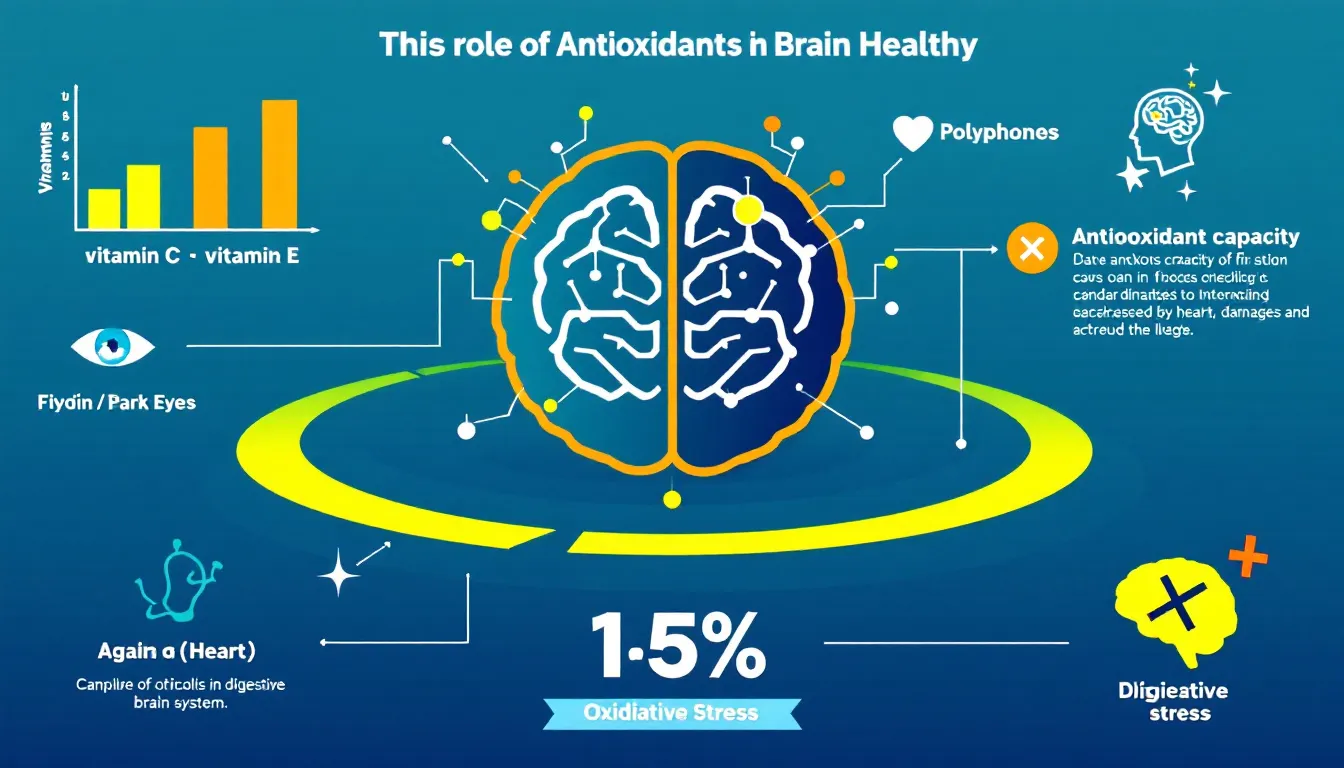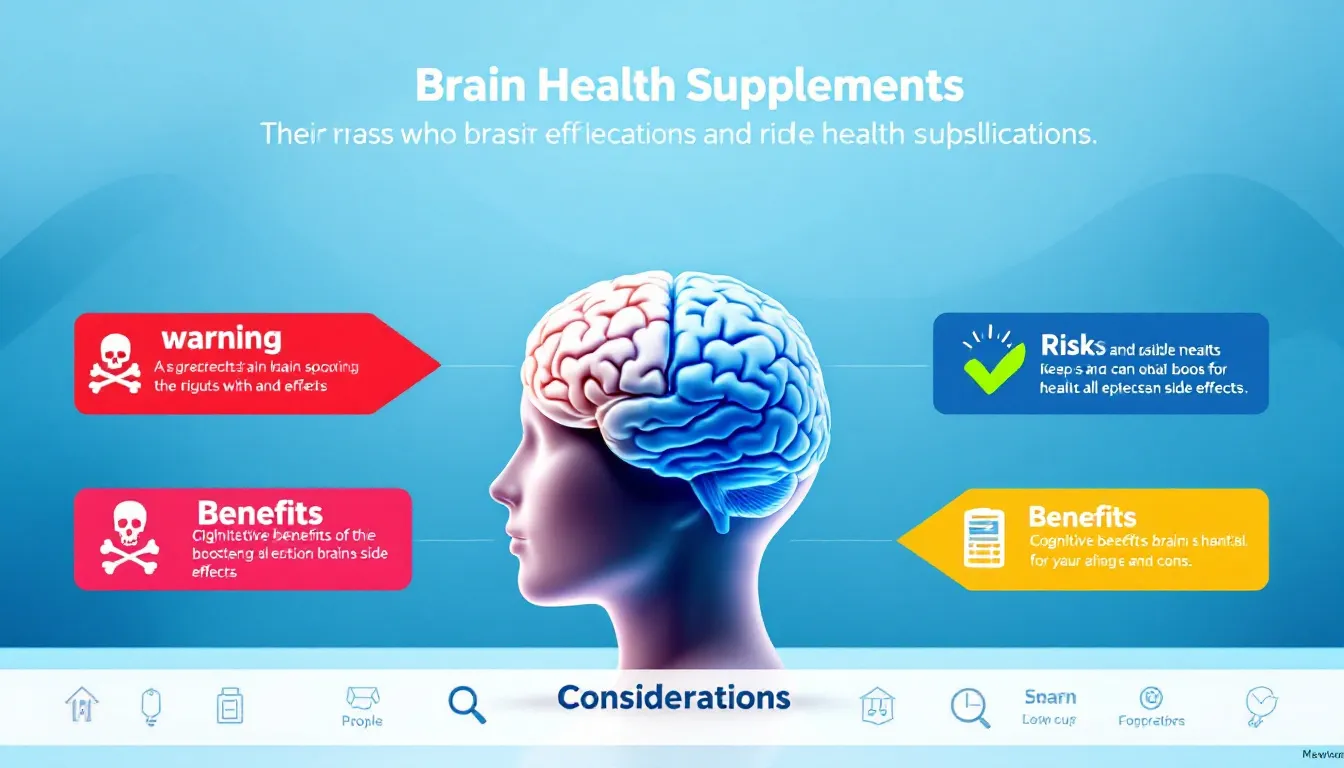Your basket is currently empty!
If you’re looking for a supplement for brain function to improve your cognitive abilities, you’ve come to the right place. This article explores the top 8 supplements that can enhance memory, increase focus, and support overall cognitive health.
Key Takeaways
Essential nutrients like Omega-3 fatty acids, B vitamins, and Vitamin D are crucial for maintaining cognitive health and preventing cognitive decline.
Popular supplements, including Ginkgo Biloba, Methlyene Blue, Phosphatidylserine, and Bacopa Monnieri, are gaining attention for their potential cognitive-enhancing properties.
Lifestyle factors such as diet and exercise play a significant role in brain health, focusing on incorporating a balanced diet and engaging in regular physical activity.
Essential Nutrients for Brain Function

Recognising the specific nutrients key to maintaining and supporting normal brain function is critical for preserving cognitive health. Essential elements such as Omega-3 fatty acids, B vitamins, and Vitamin D significantly enhance memory, increase mental prowess, and fight fatigue and confusion by shielding brain cells from oxidative harm while boosting neurotransmitter activity.
Incorporating these crucial vitamins and minerals into a well-rounded diet can profoundly affect one’s cognitive abilities and alertness. Although the influence of each nutrient might not be overwhelmingly noticeable without an overall dietary strategy, they are undeniably essential for sustaining both normal cognitive function and standard brain operations.
Omega-3 Fatty Acids
Omega-3 fatty acids are essential nutrients that significantly support brain health. They play a critical role in the formation of cell membranes and offer protection from inflammation and oxidative stress within the brain. Docosahexaenoic acid (DHA), a primary structural component in the brain’s fat composition, is fundamental for sustaining healthy brain functioning. Eicosapentaenoic acid also contributes to this process, with dietary intake from sources like oily fish such as salmon and mackerel crucial for maintaining good brain health.
Omega-3 algae oil is an excellent substitute for individuals who adhere to plant-based diets. Nuts, including walnuts, offer considerable benefits due to their rich omega-3 content. Although readily accessible omega-3 supplements exist, deriving these nutrients directly from whole foods typically proves more beneficial.
Adding Omega-3 fatty acids into one’s diet can be effortlessly achieved by eating servings of oily fish multiple times weekly or incorporating daily portions of walnuts into meals or snacks. Those unable to meet their Omega-3 requirements via diet alone may find it helpful to utilise dietary supplement options like fish oil or algae oil capsules. It should be noted that obtaining these vital fats from natural food sources usually ensures a wider spectrum of nutritional advantages over opting solely for supplements.
B Vitamins
Vitamin B group, encompassing nutrients such as B6, folic acid (B9), and B12, is integral to brain health. These vitamins are key in producing neurotransmitters that facilitate communication within the brain networks—a process crucial for memory and cognitive functions. Given their vital role in neurological processes, maintaining a sufficient level of these vitamins is essential, especially for vegans, since vitamin B12 is rare in plant-based foods.
A well-rounded diet rich in leafy green vegetables, nuts, seeds, and fortified cereals can ensure adequate daily consumption of these important B vitamins. Such dietary practices support cognitive capabilities by providing necessary nourishment.
Dietary supplements offer a practical alternative in cases where one might struggle to meet their nutritional needs through food alone due to dietary restrictions or other challenges. Regularly integrating such supplements into your regimen aids in sustaining optimal brain function and is a preventive measure against cognitive deterioration while enhancing mental sharpness and overall cognitive prowess.
Vitamin D
Vitamin D possesses qualities that enhance cognitive performance and safeguard the brain’s health, playing a significant role in its protection. Those who receive insufficient sunlight exposure, including those residing in northern regions or those with predominantly indoor routines, are advised to contemplate vitamin D supplementation to bolster their cognitive abilities and overall brain health.
Ensuring sufficient vitamin D intake is crucial for maintaining normal brain functioning and averting deterioration in cognition.
Popular Supplements for Cognitive Health

The brain health supplement market is expanding significantly, with forecasts predicting considerable growth shortly. This increase mirrors the growing interest in products designed to enhance mental alertness and cognitive function.
Supplements such as Ginkgo Biloba have gained prominence due to their purported advantages in halting cognitive decline and boosting cognitive performance. These supplements are frequently promoted for their ability to bolster brain health and safeguard brain cells, rendering them an appealing option for individuals seeking to improve their cognitive abilities.
Ginkgo Biloba
Ginkgo Biloba is a prominent supplement for brain health, frequently taken to bolster memory. It enhances blood flow to the brain and offers antioxidant protection that boosts nutrient delivery and absorption in brain cells. Although often utilised for maintaining mental sharpness and assisting brain function, evidence suggests it doesn’t substantially alter dementia progression.
Despite inconsistent scientific findings regarding its effectiveness, Ginkgo Biloba remains a go-to supplement for individuals aiming to enhance their cognitive abilities and memory retention. Typically administered in daily doses ranging from 120-240 mg, this herbal extract is also featured extensively within various products to support overall brain health.
Prior to integrating Ginkgo biloba into your dietary regimen, seeking advice from a healthcare professional is crucial, particularly if you have pre-existing medical conditions or are currently on other medication regimens.
Phosphatidylserine
Phosphatidylserine is vital in ensuring effective communication among brain cells, which is fundamental to cognitive function. It is frequently incorporated into supplements aimed at enhancing brain health due to its ability to bolster memory and promote mental sharpness potentially.
This phospholipid contributes significantly to the proper functioning of cell membranes, thereby protecting brain cells and fostering overall cognitive well-being.
Bacopa Monnieri
Bacopa Monnieri is widely recognised as a natural supplement that boosts brain function. It’s rich in antioxidants that safeguard neurons against oxidative stress caused by free radicals.
Research on Bacopa Monnieri reveals its capacity to:
Boost focus
Improve self-discipline, which is particularly advantageous for those experiencing mild cognitive impairment and ADHD
Promote the growth of dendrites
Enhance the speed at which visual information is processed, aiding in memory improvement.
A specialised extract of Bacopa Monnieri known as BacoMind® has been proven to aid in enhancing memory processing and retrieval capabilities. Due to these properties, this herb frequently appears in products targeting brain health for its ability to maintain cognitive abilities, combat forgetfulness, and preserve neuronal integrity.
Adding Bacopa Monnieri into your daily routine can significantly improve your cognitive acuity and increase mental sharpness.
Methylene Blue
Methylene blue, a synthetic dye with antioxidant properties, has gained popularity as a cognitive health supplement. It enhances mitochondrial function and cerebral blood flow, potentially improving memory, focus, and mental clarity. Research suggests it may protect against neurodegenerative conditions by reducing oxidative stress in brain cells. It is used in low doses for cognitive benefits.
Herbal and Natural Supplements
Herbal and natural supplements support cognitive health and enhance brain function. Emerging compounds like ashwagandha and ginseng are increasingly included in brain health supplements due to their recognised cognitive enhancement properties.
The future of brain health supplements looks promising with the continued exploration of herbal options and their cognitive benefits.
Ginseng
Ginseng is highly regarded in traditional Chinese medicine for its ability to improve mental function and help manage stress. Ginsenosides, the key active elements found in ginseng, are thought to play a significant role in these cognitive advantages. While small randomised controlled trials have yielded mixed results regarding ginseng’s effectiveness due to varying study designs, it has been deemed safe, as no major adverse effects have surfaced.
Many people incorporate ginseng into their daily regimen to promote brain health, tackle stress symptoms, and improve alertness. Available as dietary supplements or through classic preparations, ginseng continues to be favoured by those seeking natural methods for enhancing cognitive performance and maintaining healthy brain function.
Curcumin
The active ingredient in turmeric, curcumin, is recognised for its strong antioxidant and anti-inflammatory effects. Because of these effects, curcumin has become a significant supplement component to protect brain cells and foster cognitive health. It is thought that curcumin might help mitigate inflammation and oxidative stress—two factors commonly associated with the deterioration of cognitive abilities.
Research points to the potential benefits of curcumin in enhancing symptoms related to memory deficits and concentration issues.
Robust studies are needed to verify these findings. While animal research has demonstrated encouraging outcomes regarding the protection from cognitive decline, evidence from human clinical trials is not yet definitive.
Many brain supplements feature curcumin because of its presumed capabilities in maintaining brain health and thwarting the progression of cognitive impairment.
The Role of Antioxidants

Antioxidant activity is vital in safeguarding brain cells from oxidative stress, which is associated with a decrease in cognitive abilities. Antioxidants achieve this by counteracting free radicals, promoting improved brain health and aiding in maintaining cognitive function. Notably, substances like polyphenols and probiotics are recognised for their possible protective benefits on the neurons concerning cognitive deterioration.
Incorporating antioxidants into your nutritional regimen or via supplementation could be beneficial in preserving brain cell integrity and ensuring ongoing cognitive wellness.
Vitamin E
Vitamin E is a potent antioxidant that can penetrate the blood-brain barrier, which may contribute to staving off cognitive decline. The antioxidative function of vitamin E assists in safeguarding brain cells from the detrimental effects of oxidative stress, thereby helping to slow down decreases in cognitive abilities. Foods high in vitamin E, such as nuts, seeds, and leafy green vegetables, are beneficial dietary sources for those looking to boost their intake. Should these foods not suffice, one might consider taking dietary supplements as an alternative means of increasing vitamin E levels.
By adding foods rich in Vitamin E, like almonds, sunflower seeds, and spinach, to your diet, you can yield considerable advantages for maintaining brain health. When food alone doesn’t meet nutritional needs regarding this essential nutrient, incorporating dietary supplements is a practical approach for ensuring sufficient consumption to preserve cognitive functions.
Vitamin C
Recognised for its antioxidative capabilities, vitamin C is crucial in safeguarding the brain against oxidative harm and could help diminish the likelihood of cognitive decline. By bolstering neurological operations, consistent consumption of vitamin C may decrease the risk associated with cognitive impairment while enhancing overall cognitive well-being. Vitamin C is readily available through dietary sources such as fruits and vegetables, allowing seamless integration into a well-rounded diet.
For individuals who struggle to obtain sufficient levels of vitamin C solely from their meals, adding a supplement to their daily regimen can be beneficial. Maintaining proper intake of this vital nutrient is instrumental in defending brain cells against oxidative stress and reinforcing general cognitive function.
Methylene Blue
Methylene Blue (MB) serves as a powerful antioxidant by acting as an electron cycler in the mitochondrial electron transport chain, effectively bypassing dysfunctional complexes and enhancing ATP production. Research demonstrates MB’s ability to scavenge reactive oxygen species (ROS) and reduce tissue oxidative damage. Studies published in the Journal of Biological Chemistry show MB decreases mitochondrial superoxide formation and prevents oxidative stress in neurons. Additional research in FASEB Journal indicates MB’s potential in attenuating oxidative stress-related conditions, including neurodegenerative diseases. MB’s hormetic properties—providing benefits at low doses while becoming pro-oxidant at higher concentrations—make it a promising therapeutic agent for conditions characterised by redox imbalance.
Lifestyle Factors Enhancing Brain Function

Choices in daily living are crucial for preserving the health of one’s cognition. Regular exercise and adhering to a healthy eating plan are fundamental approaches to bolster brain health. Diets such as the Mediterranean, DASH, and specifically the mind diet have demonstrated efficacy in augmenting cognitive function. Physical activity serves as an aid in reducing stress and anxiety, both of which can lead to a deterioration of cognitive capabilities.
Adopting lifestyle modifications that include changes in what you eat and maintaining consistent physical activity is vital for nurturing brain health and warding off declines in cognitive performance.
Exercise
Regular physical exercise offers substantial advantages for maintaining brain health, as it promotes better blood circulation and aids in mood management. When one participates in aerobic exercises such as walking or swimming for 30 to 60 minutes on several occasions each week, the flow of blood to the brain increases. To achieve ideal benefits for the brain, engaging briskly in moderate-intensity activities like walking is suggested at a cumulative duration of no less than 150 minutes per week.
For older individuals aiming to enhance their cognitive abilities, particularly those pertaining to executive functions, including problem-solving capabilities and concentration levels, practices such as Tai Chi can be beneficial. By integrating consistent exercise into your daily regimen, you are taking important steps toward supporting overall brain health and preserving mental acuity throughout the ageing process.
Mental Stimulation
Acquiring new skills and undertaking intricate tasks is crucial for fostering neural linkages within the brain, thereby bolstering its overall health. Mastering fresh abilities and navigating complex challenges contribute to the proliferation of neuronal connections, which enhances intellectual capabilities. Engaging in activities such as puzzle-solving, reading, and gaming can be instrumental in maintaining brain vitality by warding off cognitive deterioration while augmenting mental agility.
Incorporating intellectual exercises into one’s regular schedule can profoundly enhance cognitive function and boost mental acumen. Whether it involves learning a novel language, playing an instrument, or indulging in problem-solving games, these pursuits are pivotal in keeping the mind active and fostering good cognitive well-being.
Risks and Considerations

It’s crucial to recognise that, although dietary supplements can benefit brain health, there are potential hazards and factors to consider. Dietary supplements aren’t subject to the same rigorous regulation by the FDA as pharmaceutical drugs are, which permits producers of these products to promote benefits without solid proof. Consequently, one cannot always ensure their efficacy or safety.
In particular, taking higher doses of some supplements, such as curcumin, has been linked with gastrointestinal side effects. This suggests that individuals should exercise increased caution when using certain supplements due to the heightened risk of adverse reactions.
Interactions with Medications
Patients using cognitive health supplements should consult healthcare professionals to ensure safe medication use. Supplements and prescription medications can interact potentially, affecting treatment outcomes. Patients need to have their medications reviewed by clinicians to identify potential interactions and avoid adverse effects.
Consulting with a healthcare professional before taking supplements can help ensure that they complement your existing treatment plan and do not interfere with any prescription drugs you may be taking. This step is crucial in managing your overall health and preventing negative interactions.
Over-supplementation
Overconsumption of brain health supplements can be detrimental and may result in negative side effects, and there is a lack of solid evidence to back up claims regarding their benefits. Many of these brain supplements are not subject to FDA regulation, leading to potential ingredient inaccuracies and questionable effectiveness. Despite the widespread use of cognitive health supplements, many clinical trials have been unable to demonstrate significant improvements in brain health attributed to individual vitamins and minerals.
Too much reliance on these supplements could discourage individuals from engaging in essential lifestyle modifications that might enhance cognitive function. It is believed that obtaining nutrients through a well-rounded diet offers more advantages for maintaining good brain condition than supplement intake alone does. Maintaining a nutritious diet and overall healthy lifestyle should take precedence over the excessive use of supplements when considering ways to support brain health.
Future Research and Trends
Continued exploration into natural solutions and groundbreaking components bodes well for the advancement of brain health supplements. For instance, consuming more fish has been linked to a diminished likelihood of experiencing cognitive deterioration, underscoring diet’s significant role in maintaining brain health. Specialists advocate opting for a well-rounded diet enriched with crucial vitamins and nutrients over relying on supplements to foster cognitive vitality.
As the demographic of healthy older individuals grows and predictions indicate an uptick in cognitive impairment occurrences, devising potent methods to support cognitive well-being is increasingly critical. This is particularly pertinent when it comes to mitigating behavioural issues and various disturbances associated with cognition and behavior and addressing risk factors inherent in this context.
Innovative Ingredients
New components are essential for creating advanced methods to improve cognitive functions and maintain overall brain health. Supplementation with DHA, an important omega-3 fatty acid, aids in maintaining cognitive health and has shown particular advantages for those with mild cognitive impairment. Research suggests that DHA enhances the functionality of brain cells and might contribute to preventing the progression of cognitive decline.
The ongoing emergence of new studies holds potential for discovering novel ingredients that can further boost various aspects of cognition. Such progress may give rise to enhanced dietary supplements specifically designed to bolster brain health and elevate levels of cognitive performance.
Personalised Supplementation
The movement toward customising supplementation strategies to accommodate personal dietary requirements and genetic tendencies is gaining momentum. Research has underscored the significance of distinct nutritional necessities and genetic makeup, leading experts to predict an upsurge in personalised supplement plans, as substantiated by a systematic review. Breakthroughs in metabolomics are setting the stage for bespoke nutrient solutions designed specifically with brain health considerations informed by data from nutrition examination surveys.
By adopting this tailored approach, individuals can ensure they receive precisely what their bodies need regarding nutrients, thereby maximising the advantages of dietary supplements for preserving cognitive health. With ongoing advancements in scientific understanding, such individualised supplementation regimens will likely become crucial components in supporting and improving overall brain function.
Summary
In summary, preserving cognitive function involves a blend of vital nutrients, well-known supplements, and behavioural choices. Essential for bolstering brain health and preventing cognitive decline are elements such as omega-3 fatty acids, B vitamins, and vitamin D. Popular supplements like Methlyene Blue, and Ginkgo Biloba contribute to potential enhancements in memory and alertness levels. Herbal remedies such as Ginseng and Curcumin are natural options for boosting cognitive abilities while safeguarding brain cells.
Engaging regularly in physical activity and intellectual challenges is crucial to sustaining cognitive vitality. Although supplemental aids can reinforce brain health, recognising the associated risks is essential. Seeking advice from medical professionals helps ensure their safe application. With ongoing exploration into new supplement components and tailored nutrition strategies on the horizon for brain health supplements, their outlook remains promising.
Committing to a nutritious diet complemented by an energetic lifestyle alongside judicious use of supplementary aids could enhance your overall neurological wellness, leading to elevated mental performance capabilities.
Frequently Asked Questions
What are the most essential nutrients for brain function?
Essential for peak brain performance, omega-3 fatty acids contribute to forming cell membranes and neurotransmitter production while B vitamins and vitamin D protect against oxidative harm.
Focusing on these crucial nutrients can greatly improve cognitive well-being.
Are there any risks associated with taking brain supplements?
Yes, taking brain supplements can pose risks such as interactions with prescription medications and the danger of over-supplementation, which may lead to harmful side effects.
Consulting a healthcare professional before use is essential.
How can lifestyle choices impact cognitive health?
Choices in daily life have a substantial influence on cognitive well-being. Consistently engaging in physical exercise, consuming a healthy diet, and participating in activities that stimulate the mind are essential for improving brain health and warding off the deterioration of cognitive abilities.
Maintaining these practices can result in enduring beneficial impacts on your ability to think and process information.
What is the role of antioxidants in brain health?
Antioxidants protect brain cells from oxidative stress associated with cognitive decline. Notably, vitamins E and C effectively support cognitive function and promote overall brain health.
What trends are emerging in the field of brain health supplements?
Scientific Advancements
Nootropic stacking based on complementary mechanisms of action
Adaptogens gaining prominence for stress management and cognitive resilience
Microbiome-targeted formulations supporting gut-brain axis health
Neuroplasticity-enhancing compounds for long-term cognitive function
Formulation Innovations
Liposomal and nanoparticle delivery systems are improving bioavailability
Time-released formulations for sustained cognitive support
Plant-based and whole-food derived cognitive enhancers
Clean label products with minimal additives and fillers
Personalisation Approaches
Genetic testing to identify individual nutrient needs and metabolic factors
Biomarker monitoring to measure supplement effectiveness
AI-driven supplement recommendation algorithms
Subscription services offering customised cognitive support regimens
Regulatory and Consumer Trends
Increased demand for clinical research backing supplement claims
Growing interest in sustainable and ethically sourced ingredients
Rise of comprehensive cognitive health stacks rather than single ingredients
Integration with digital health platforms for tracking cognitive performance

